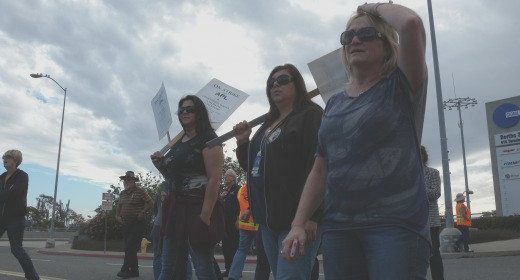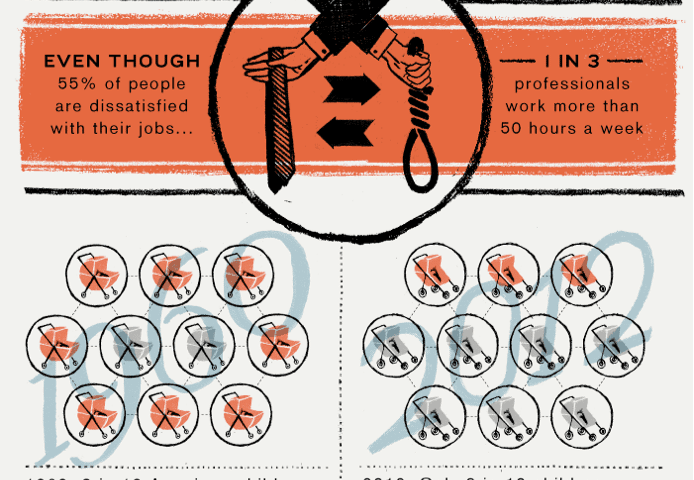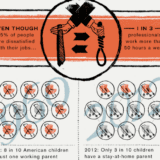

 I’m going to be frank – I’d do just about anything for a good union job. But as a twenty-something worker with limited job experience who’s been seeking permanent, full-time employment for nearly a year, I’d be willing to take just about any job.
I’m going to be frank – I’d do just about anything for a good union job. But as a twenty-something worker with limited job experience who’s been seeking permanent, full-time employment for nearly a year, I’d be willing to take just about any job.
But I’d really like a union job.
Not just for the job stability, solid wages and good benefits (don’t get me wrong, those are huge selling points), but because I want to be part of the historic and ground-breaking movement that’s responsible for creating, growing and maintaining America’s middle class.
As a member of a union household, I’ve experienced first-hand the benefits that unions can bring to young families like mine. But when I look around at my friends and others my age, it’s clear that my family is in the exceptionally fortunate minority. Most of our friends (regardless as to whether they have high school diplomas or law degrees) would bend over backwards to have the job security that my wife does.




“Want to avoid paying half of your employees’ Social Security tax? Reclassify them as ‘independent contractors’ so they pay it all themselves. Make them fill out a 1099. ‘That’s not a fulltime busboy, that’s Juan Co., LLC. Don’t forget to invoice us, Juan Co.’”
(John Stewart, The Daily Show, November, 2012)
As far back as 1989, a Government Accounting Office study found that 38 percent of the employers examined misclassified employees as independent contractors. As a labor lawyer for the past two decades, I’ve represented hundreds of bakery drivers who deliver and shelve bread and chips for grocery stores. In that industry, some companies use employees, some use independent contractors, and some use both, yet I have seen a steady shift away from employees. Why? By labeling workers “independent contractors,” bakeries (and grocery stores), like the Port of Los Angeles,
» Read more about: Corporate Magic: Turning Employees Into Contractors »


Thursday, December 6, Los Angeles Mayor Antonio Villaraigosa signed two ordinances passed by the City Council approving the long-term purchase of solar power from a new development on tribal land in Nevada. The clean energy produced there will be enough to power more than 100,000 homes for 25 years.
The agreement is important here in Los Angeles, as the city moves away from coal and towards solutions like renewable energy and energy efficiency.
But we need more from our investments than clean energy alone. We need that investment to lift up communities that have been struggling in this economy. Thanks to the work of advocates over the years, some political leaders are embracing that connection.
“These solar contracts are proof-positive that environmental progress and economic growth go hand-in-hand,” Mayor Villaraigosa said Thursday. The signing ceremony took place at Occidental College, which is home to its own solar array.
» Read more about: Nevada Solar Project: Turning on the Sun for Clean Energy »


 A year or so ago, while picking up socks off of the living room floor, and considering the innumerable tasks of being a single parent, I exclaimed to my kids, “You know what? We think what we need is more money, but what we really need is community.”
A year or so ago, while picking up socks off of the living room floor, and considering the innumerable tasks of being a single parent, I exclaimed to my kids, “You know what? We think what we need is more money, but what we really need is community.”
It occurred to me that I was upset about my money flow, but I was equally upset about the growing sense of isolation that comes with a lack of connectedness with the people in my apartment complex, my street and my city.
Little did I know that those words that tumbled from my mouth would soon be so prophetic for me and the community I live in.
A long-time resident of Long Beach, I was raised in a multicultural working class neighborhood in the city. We weren’t rich–Dad is a military veteran and Mom worked for the phone company–but my family owned their home and impressed upon us a strong work ethic.
» Read more about: Enriching the Community with a Living Wage »


 Tuesday, the Los Angeles Times editorial board encouraged measured consideration when it comes to how much private matters should impact a public figure – in this case Andrea Alarcon, the president of the L.A. Board of Public Works Commission. The editorial acknowledges that no charges have been brought against Alarcon, and that personal troubles are not always relevant to whether a public servant can continue to do their civic duty. (Certainly, Alarcon isn’t the first L.A. public official in recent memory who has kept working despite a private issue.) This reasoned editorial was refreshing, particularly given that L.A. Times reporters have heretofore covered the family matter, for which there has been no arrest or charge, as if it were the latest celebrity gossip.
Tuesday, the Los Angeles Times editorial board encouraged measured consideration when it comes to how much private matters should impact a public figure – in this case Andrea Alarcon, the president of the L.A. Board of Public Works Commission. The editorial acknowledges that no charges have been brought against Alarcon, and that personal troubles are not always relevant to whether a public servant can continue to do their civic duty. (Certainly, Alarcon isn’t the first L.A. public official in recent memory who has kept working despite a private issue.) This reasoned editorial was refreshing, particularly given that L.A. Times reporters have heretofore covered the family matter, for which there has been no arrest or charge, as if it were the latest celebrity gossip.
Alarcon’s tenure with the City should be judged solely on her job performance – and she is an incredible asset to Los Angeles.
» Read more about: A Thoughtful L.A. Times Editorial on Andrea Alarcon »


 I want to vote for a comprehensive bipartisan plan to address the fiscal cliff. I’m willing to take a tough vote. I’m willing to make sacrifices. I’m willing to feel the heat. But I’m not willing to solve the fiscal cliff by throwing seniors over the cliff. I draw the line at cutting benefits in Medicare and Social Security.
I want to vote for a comprehensive bipartisan plan to address the fiscal cliff. I’m willing to take a tough vote. I’m willing to make sacrifices. I’m willing to feel the heat. But I’m not willing to solve the fiscal cliff by throwing seniors over the cliff. I draw the line at cutting benefits in Medicare and Social Security.
This week, House Republicans unveiled their fiscal cliff counterproposal. While they continue to call for an extension of the Bush tax cuts for millionaires and billionaires, they propose offsetting this cost by gutting Medicare benefits, including raising the age of Medicare eligibility to 67. I won’t go there. As California’s Insurance Commissioner for eight years, I know this would be horrible policy, throwing millions of seniors into the rapacious hands of an insurance industry interested only in profits for its shareholders.
Medicare is a promise we made to seniors more than four decades ago.
» Read more about: Fiscal Cliff Notes: Protecting Medicare and Social Security »


Lawsuits alleging wage and hour violations are on the rise, but a case currently before the Supreme Court could tilt the balance of power toward employers in wage theft cases.
The Supreme Court heard oral arguments in Symczyk v. Genesis Healthcare Corp. on Monday; the American Prospect summarizes the details of the case:
The case involves a lawsuit filed by Laura Symczyk, who alleged that Genesis Healthcare had committed wage theft against her and her co-workers. According to Symczyk, Genesis routinely docked the pay of workers (including herself) for lunch breaks that were not taken. Reflecting the strength of her claim, Genesis offered her $7,500 plus associated fees to settle. Symczyk, however, rejected the offer, believing that she was suing not just for herself but for her co-workers. She wanted time for her lawyers to determine if her case could be brought as a class-action suit,
» Read more about: Supreme Court Could Block Worker Class-Action Suits »


When their incompetence kills good union jobs.
By now, we’ve all seen the outrageous headlines about Hostess executives getting $1.8 million in bonuses to liquidate their junk food company and eliminate 18,000 good jobs at bakeries and other facilities all across the country.
The company’s well-paid executives claim that union workers killed the company. Corporate propagandists echo this line, declaring that “Unions Killed the Goose That Made Hostess Brands Gold.”
Business experts know better. As an analyst at Forbes reported, Hostess executives killed the company because they “failed to reinvent its junk food product line and make it more enticing to health conscious palates.” To make a bad situation worse they let private equity firms “load up the company with debt” that enriched hedge fund investors without helping the company.
» Read more about: The Hostess with the Mostest … For the One Percent »




The nine-day strike by International Longshore and Warehouse Union clerks at the ports of Los Angeles and Long Beach has tentatively ended with a new contract with the Harbor Employers Association. If approved by the union’s membership, the pact will expire in 2016.
It was tempting to joke that the strike was a case of deja vu all over again – if the stakes weren’t so high for the port clerks’ Local 63. The sticking point was the outsourcing of jobs offsite, an issue that many thought was resolved with the local’s 2007 contract with port employers. Technology has made such job migration possible – and desirable — for shipping companies and terminal operators. Since the ILWU’s historic pivot in 1960 toward accepting labor-saving mechanization in exchange for greater member benefits and job security, the union has shown a consistent ability to accept and adapt to technology – even while that acceptance has reduced its membership.
» Read more about: Longshore Clerks Tentatively Agree to New Contract »


The magic of El Sistema, Venezuela’s program of taking impoverished kids and teaching them classical music, can be summed up in one sentence uttered by its founder, Dr. Jose Abreu: “If you put a musical instrument in the hand of a kid, he or she will not pick up a gun.” It is somewhat of a miracle, although it is an old idea. The creative impulse (which resides in everyone) can act as a curandero, or healer, to re-imagine dead-end paths down which poor children are headed, and find new roads that are limitless. America is slow to realize this. With weak economic times, we always cut funding for the arts, when that is a time to increase fields that foster new imagination, new ways of thinking. Holding on to our narrow vision that South America stole our name, we know something is happening south of the border,
» Read more about: John Densmore on the Simón Bolívar Youth Orchestra »


 Few things have been a bigger buzz kill to the holiday season than the New York Times‘ epic investigative series questioning state and city government subsidies to big business. If you thought super-rich individuals were getting away with not paying their fair share (or any share) of taxes, the Times now lifts the veil from a system of corporate blackmail wherein companies are basically being given the tax dollars we pay to government. In exchange, these companies promise to do – nothing.
Few things have been a bigger buzz kill to the holiday season than the New York Times‘ epic investigative series questioning state and city government subsidies to big business. If you thought super-rich individuals were getting away with not paying their fair share (or any share) of taxes, the Times now lifts the veil from a system of corporate blackmail wherein companies are basically being given the tax dollars we pay to government. In exchange, these companies promise to do – nothing.
In the case of heavy industry, “nothing” means a manufacturing company will tell a locality that it may have to move its decades-old plant to another state or country unless it gets a whole lot of tax breaks, free sewage improvements and road repairs. In the case of Oliver Stone’s movie company and its plans to shoot a New York-specific story,
» Read more about: Business Tax Subsidies: The Grift That Keeps on Giving »




On Robert Reich’s website the economist and U.C. Berkeley public policy prof has eight simple principles for Congressional progressives to follow as they tangle with conservatives over that contentious piece of topography called the Fiscal Cliff:
» Read more about: Robert Reich's Advice to Fiscal Cliff Dwellers »


Bangladesh is half a world away from Bentonville, the Arkansas city where Walmart is headquartered. This week, Walmart surely wishes it were farther away than that.
Over the weekend, a horrific fire swept through a Bangladesh clothing factory, killing more than 100 workers, many of whose bodies were burnt so badly that they could not be identified. In its gruesome particulars — locked doors, no emergency exits, workers leaping to their deaths — the blaze seems a ghastly centennial reenactment of the Triangle Shirtwaist fire of 1911, when 146 workers similarly jumped to their deaths or were incinerated after they found the exit doors were locked.
The signal difference between the two fires is location. The Triangle building was located directly off New York’s Washington Square. Thousands watched the appalling spectacle of young workers leaping to the sidewalks 10 stories down;
» Read more about: Walmart and Costco: Worlds of Difference »


 In the next decade, America will be transformed by a new wave of progressive activism, led primarily by organizers, thinkers, and politicians born after 1960. It is already bubbling below the surface, in workplaces, neighborhoods, churches, college campuses, think tanks, and foundation offices. Many of these young progressives have already waged successful campaigns to win public office, change public policy, and inject new ideas into our political culture.
In the next decade, America will be transformed by a new wave of progressive activism, led primarily by organizers, thinkers, and politicians born after 1960. It is already bubbling below the surface, in workplaces, neighborhoods, churches, college campuses, think tanks, and foundation offices. Many of these young progressives have already waged successful campaigns to win public office, change public policy, and inject new ideas into our political culture.
There is no simple formula for successful social movements, but they all share a few characteristics. First, they embrace an “inside/outside” strategy, mobilizing people to protest, boycott, lobby, and vote, while simultaneously working closely with allies in government. Second, they don’t expect to bring about change overnight. They are long-distance runners, not sprinters. They try to win stepping-stone victories that lay the groundwork for further reforms. Third, while they work on separate issues, they recognize that they are part of a broader movement that requires building coalitions and developing trust.
» Read more about: Young & Restless: 50 Activists Who Are Changing America »


With the rejection of Mitt Romney’s economic vision, wherein the invisible hand of the free market guides us to prosperity (at least those not in the lazy 47 percent), progressives are now on the spot to offer up a compelling alternative.
Using animation and the vocal talents of Ed Asner, the Los Angeles Alliance for a New Economy (LAANE) jumps into the ring with the short video “It’s in Our Hands.” This is no ten-point plan, but instead a conceptual piece whose primary assertion is that we start to take the idea of democracy much more seriously when it comes to the economic order of things.
What if we could shape the U.S. economy to reflect the values and interests of most Americans? LAANE, which has had some success in doing just that, maintains that we can — and must.
» Read more about: Building a New Economy Video With Ed Asner »


While he was alive, the baseball establishment five times rejected Marvin Miller, who freed players from indentured servitude, from its Hall of Fame. The Major League Baseball Players Association, which Miller headed from 1966 to 1983, sat on its hands, failing to raise a stink about this outrageous miscarriage of justice.
Miller, who died on Tuesday at 95, was never bitter about his exclusion from the Cooperstown shrine. As a staunch unionist, he knew which side he was on and understood that the baseball owners and executives who control the Hall of Fame would rig the rules to keep him out. The baseball moguls have always viewed their teams as personal fiefdoms and are among the most ferociously anti-union crowd around.
But what’s appalling is the timidity of the Players Association to mount a campaign on Miller’s behalf. Over the years, many Hall of Fame players—including Tom Seaver,
» Read more about: Marvin Miller: Locked Out of Baseball's Hall of Fame »


The New York Times’ FiveThirtyEight blogger, Nate Silver, had some choice words about Politico, which had taken pot shots at his election-polling skills during the recently concluded presidential campaign. Politico wasn’t alone: The entire spectrum of right-wing punditry, led by Fox News, attacked Silver for predicting that an Obama victory was at least 80 percent certain. The Electoral College specifics of Silver’s long-prophesied Obama win turned out to be uncannily accurate.
The forum for Silver’s comments was Grantland.com sports blogger Bill Simmons’ “B.S. Report” podcast, during which, as Talking Points Memo reports, Silver noted:
What was remarkable to me is that you had some, like, journalist for, um, Politico, or something … who, like, tweeted … ‘All Nate’s doing is averaging polls and counting electoral votes?’ … ‘That’s the secret sauce?’ It’s like, well, yeah, and the fact that you can’t comprehend that very basic thing … that says more about you than,
» Read more about: Nate Silver to Politico: "You Can't Comprehend!" »